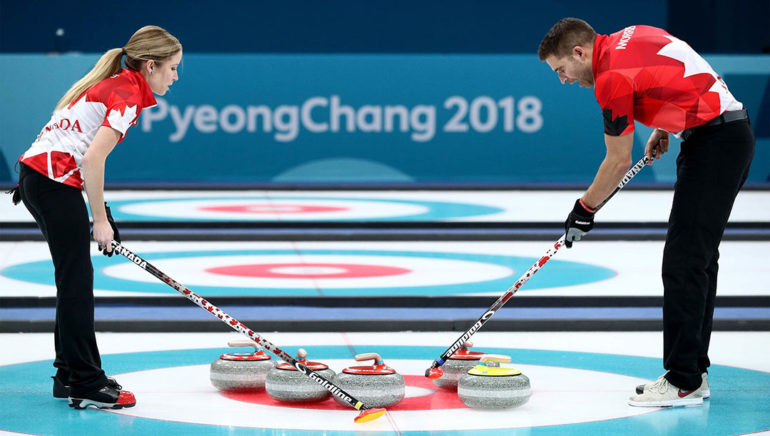
(Getty Images)
Canadian athletes Kaitlyn Lawes and John Morris competing in the 2018 Winter Olympics in PyeongChang on Tuesday.
Christina Mulherin
Canadian athletes won three more olympic medals on Tuesday – two of which made history.
Curling athletes John Morris and Kaitlyn Lawes became the first ever winners of the mixed doubles event. They are also Canada’s first olympic double gold medalists in curling.
Dream come true!! Thank you everyone for your kind messages and support! ??❤ https://t.co/Lhv6EUh1Mk
— Kaitlyn Lawes (@LKLawes) February 13, 2018
“I went out there and I wanted to embrace every moment and I want to have fun and enjoy sliding over those Olympic rings,” Lawes said in a press conference in PyeongChang.
“And no matter what is going to happen out there, we are so proud of what we were able to accomplish. I really wanted to enjoy every second of it.” added Lawes, who brought home a gold in the women’s competition after the Sochi olympics in 2014.
“You know what, it feels unbelievable – two golds for Canada. This is for everybody back home, who have always been supportive,” said her teammate, Morris ”It just feels so great. We got off to a great start. It just feels awesome to be part of this team.”
Canada now holds the most olympic medals for curling, with a grand total of 11.
Another historic medal was awarded to Alex Gough, who became the first ever Canadian luger to step on the Olympic podium.
The Calgary native scored a bronze in the women’s singles luge race, Canada’s very first olympic medal in the sport. The 18-year-old finished with a remarkable combined four-run time of three minutes 5.644 seconds.
This moment ❤
Alex Gough claims #PyeongChang2018 bronze, giving #TeamCanada its long awaited first Olympic #luge medal.
Details? https://t.co/IqzEePRLwd pic.twitter.com/dH693Vpxak
— Team Canada (@TeamCanada) February 13, 2018
“I came down behind Dajana (EITBERGER), and was like, ‘Uh, here we go, another fourth’. Then for it to turn around for me and to come out with the bronze medal was huge. It’s what I came here to do. I didn’t give up,” Gough said. “I put together what I thought was a good run. It was enough in the end. I was over the moon. I felt like the runs were really solid.”
Canada’s third medal of the day came from first-time olympian Kim Boutin, who won bronze in the women’s short track 500-metre race.
Kim Boutin wins bronze in the 500m women’s short track final here in #PyeongChang2018 @kimbtin pic.twitter.com/ZbUDUnQimQ
— CBC Olympics (@CBCOlympics) February 13, 2018
She came in fourth, but was bumped up after a South Korean competitor was disqualified. The race ended in a photo finish between Italy’s Arianna Fontana and South Korea’s Minjeong Choi. At the end of the race, judges determined that Choi had obstructed Fontana and was disqualified.
“A lot of work has gone behind this and I’m really proud to win this medal. It’s a lot of emotion right now. I just have this little thing (soft toy, not a medal). Right now I’m happy,” said Boutin.
This Canada’s fourth Olympic medal for women’s short track.
Team Canada has been at the top over the olympic leaderboard for the last three winter games. After hosting the olympics two years (Montreal in 1976 and Calgary in 1988), and not bringing home a single gold medal, things needed to change.
In 2005, Own the Podium was launched as a mission to provide top-up funding for high-performance programs to help Canadian athletes to become the number one nation at the 2010 Olympic Winter Games. Canada earned 13 gold medals at the 2010 winter games in 2010.

(Nicole Forrester, personal blog)
High jump athlete Nicole Forrester wins gold at 2012 London games.
Former olympian and current sports media professor at Ryerson University, Nicole Forrester said the hosting of the Vancouver winter games gave Canada an advantage when it comes to competing.
“The legacy of having hosted the olympics back in 2010 was definitely a great experience and I think that helped improve the way our athletes perform,” she said.
Own the Podium has since became a not-for-profit organization that invests in sports with medal potential based on athlete trajectories and data.
“Ultimately Canada wants to be the top winter sports nation,” Anne Merklinger, OTP’s chief executive officer, told Mclean Magazine in an interview.
“That’s the aspirational objective and Pyeongchang is an important step in reaching that. Our goal is to win more medals than we won in Sochi and to finish higher in the nation-ranking than we did in Sochi.
As more athletes show medal potential, the strain on OTP’s resources will increase. This comes especially after the 2012 London Games, where Canadian athletes preformed strongly at summer Olympics. Now, there’s an added development component in terms of building up competitors for not only winter Olympics, but also the summer games.
“Our biggest challenge is going to be that there are sufficient resources to support emerging sports without compromising the top sports,” Merklinger acknowledges. “We’re right in the middle of that dynamic right now. It’s early days yet to see what kind of modifications we might need to make.”
Forrester, who is an 8 time Canadian olympian competitor, also believes this year’s athletes have a lot more opportunities to bring home medals. “There are a lot more sports, so a lot more medals up for grabs,” she said.
A total of 225 Canadian are to compete in the 2018 PyeongChang Winer Games, being the country’s largest delegation of athletes to take part in olympic games.
PyeongChang is flooded with maple leaves as Canada’s largest ever Winter Olympics delegation descends on the Olympic Village sporting red, white and a few eh’s ahead of games. Good luck to #TeamCanada‘s 225 athletes! #PyeongChang2018 ?@TeamCanada pic.twitter.com/8xUZi74NvX
— Canada (@Canada) February 7, 2018

